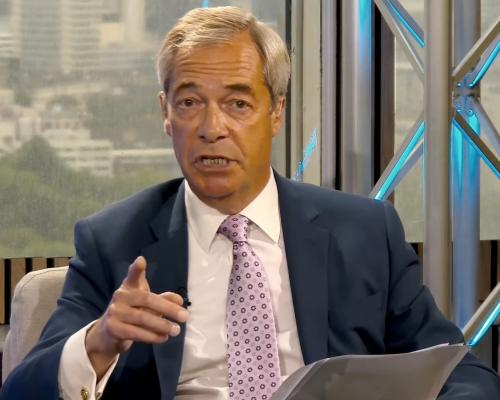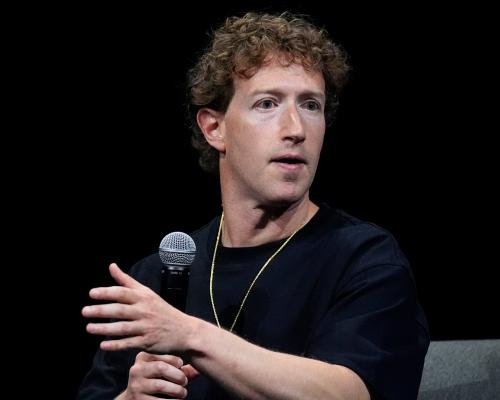
The UK’s Online Safety Act has been greatly anticipated. Amid mounting concerns about the ease of accessing harmful content online, rules were drawn up to force social platforms to protect children from posts and videos that incite hatred or encourage suicide, self-harm or eating disorders.
But within days of coming into force, the new approach to keeping children safe online had become a rallying point for the right in both Britain and the US.
Last week Nigel Farage, leader of the populist Reform UK party, was embroiled in a furious row with a Labour government minister after pledging to repeal the legislation.
Meanwhile Republicans held meetings with UK politicians and the communications regulator, Ofcom. The impact of the new law is also being keenly watched in Australia, which is preparing to ban under-16s from social media.
Experts say the inherent tensions in the act – between taking down harmful content swiftly and preserving free speech – are likely to bubble away.
Zia Yusuf, a senior Reform figure, said: “So much of the act is massive overreach and plunges this country into a borderline dystopian state.”
In response to Reform UK’s criticism of the law, Peter Kyle, the technology secretary, said: “Make no mistake about it, if people like Jimmy Savile were alive today, he’d be perpetrating his crimes online. And Nigel Farage is saying that he’s on their side.”
Kyle was referring to provisions in the act that seek to prevent children being groomed via messaging apps. Farage said the technology secretary’s words were “disgusting” and demanded an apology, which was not forthcoming.
“To say that I would do anything that would in any way aid and abet people like Jimmy Savile, it’s so below the belt,” Farage added.
It is not only the British right that is protesting against the act. JD Vance, the US vice-president, said free speech in the UK is “in retreat”. Last week, Jim Jordan, a Republican congressman who has criticised the act, led a delegation of US politicians to discuss the legislation with Kyle and Ofcom.
Jordan called the act the “UK’s online censorship law” and accused Ofcom, which is implementing the legislation, of “targeting” and “harassing” US companies. The group of Republican and Democrat politicians also visited Brussels to discuss the Online Safety Act’s EU equivalent, the Digital Services Act.
Another Republican politician in the delegation, Scott Fitzgerald, said he thought the White House would certainly be “interested in finding out” what the group discovered.
The Trump administration’s concerns have extended to threatening Ofcom and EU staff with a visa ban. In May the state department announced it will block entry to the US to “foreign nationals who censor Americans”. Ofcom has said it is seeking “clarity” on the planned visa restrictions.
Concerns over free speech also intersect with economic interest. The major tech platforms that come under the aegis of the act – Google, YouTube, Facebook, Instagram, WhatsApp, Snapchat and X – are all based in the US. Companies can be fined up to £18m or 10% of global turnover for breaches, or whichever is greater. In the case of Meta, the parent of Instagram, Facebook and WhatsApp, such a fine would equate to $16bn (£11bn).
On Friday, the social media platform X, owned by self-professed free speech advocate Elon Musk, issued a statement condemning enforcement of the act, saying the legislation was at risk of “seriously infringing” free speech.
There are also signs of a popular backlash in the UK. A petition calling for the repeal of the act has accumulated more than 480,000 signatures – which means it will be considered for a debate in parliament – and has been posted on social media by the far-right activist Tommy Robinson.
Tim Bale, professor of politics at Queen Mary University of London, doubts nonetheless whether freedom of speech is a vote-winner.
“Petition or no petition, it’s not a big issue for most people. Clearly for the extremely online – whether on the right or left – it’s an issue, but it’s not going to sway a large number of votes with the majority of the population.”
Three in four UK parents are concerned about what their children are seeing, hearing or doing online, according to a recent Ipsos Mori poll.
Beeban Kidron, a UK peer and leading campaigner on online child safety, told the Guardian she was “happy to take Nigel Farage and his colleagues through the act”.
“If companies target kids, algorithmically or otherwise, why would Reform put the kids at the mercy of tech bros?”
The new under-18 guidelines in the UK, which kicked off the latest row, require age-gating of pornography sites to prevent children from gaining access. But they also require platforms to prevent children from accessing content that encourages suicide, self-harm and eating disorders, as well as suppressing the spread of material that is abusive or incites hatred, or promotes harmful substances and dangerous challenges.
Some content has been age-gated to avoid being classified as breaching those regulations. In the Daily Telegraph, Farage claimed that footage of an anti-migrant protest had been “censored”, as well as an attempt at “exposing the truth” about the Rotherham grooming gangs scandal.
These examples were on X and included a speech by a Conservative MP, Katie Lam, on the UK’s child grooming scandal. The content was covered by a notice stating that “due to local laws, we are temporarily restricting access to this content until X estimates your age”. The Guardian found no way to access an age-verification service on X, indicating that for now the platform’s policy is to default many users to a child-appropriate service until age checks are fully up and running.
X has been approached for comment on the age-checks.
On Reddit, forums about alcohol abuse, pet care and the Al Jazeera broadcast network also ask for age checks before accessing them. A Reddit spokesperson confirmed the age-checking was because of the Online Safety Act and its restrictions on content that is illegal or harmful to under-18s.
Big Brother Watch, a civil liberties and privacy campaign group, said the Reddit and X examples showed the new law was already over-regulating.
An Ofcom spokesperson said the act required tech companies to prevent children from seeing content harmful to them as well as tackling criminal content, while protecting free speech. “There is no requirement on them to restrict legal content for adult users.”
Mark Jones, a partner at the London law firm Payne Hicks Beach, said there was a risk that in exercising their duty to remove illegal content or material that was harmful to children, social media companies may be overly cautious and remove perfectly legal material in the UK.
He added that rows over how content was treated by Ofcom were likely to run and run because of the tension between speedily tackling harmful content and letting free speech reign.
“Quick decisions are needed in order to prevent the spread of harmful or illegal content. And with that need for speed comes a risk that a decision made under time pressure may be incorrect. But that is the reality of the situation. Mistakes will be made – albeit from a position of trying to prevent harm,” he said.
Last week’s row over the Online Safety Act will not be the last.







